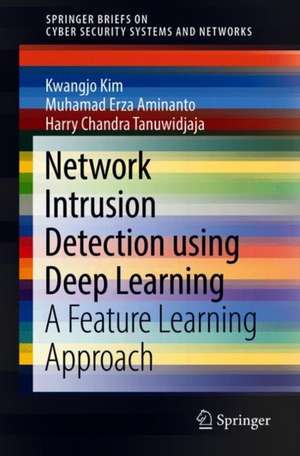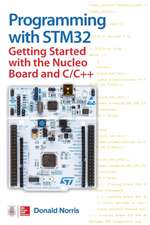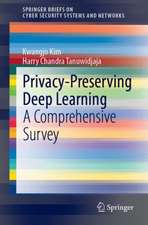Network Intrusion Detection using Deep Learning: A Feature Learning Approach: SpringerBriefs on Cyber Security Systems and Networks
Autor Kwangjo Kim, Muhamad Erza Aminanto, Harry Chandra Tanuwidjajaen Limba Engleză Paperback – 2 oct 2018
Offering a comprehensive overview of deep learning-based IDS, the book is a valuable reerence resource for undergraduate and graduate students, as well as researchers and practitioners interested in deep learning and intrusion detection. Further, the comparison of various deep-learning applications helps readers gain a basic understanding of machine learning, and inspires applications in IDS and other related areas in cybersecurity.
Preț: 379.59 lei
Preț vechi: 474.48 lei
-20% Nou
Puncte Express: 569
Preț estimativ în valută:
72.66€ • 78.95$ • 61.07£
72.66€ • 78.95$ • 61.07£
Carte tipărită la comandă
Livrare economică 21 aprilie-05 mai
Preluare comenzi: 021 569.72.76
Specificații
ISBN-13: 9789811314438
ISBN-10: 9811314438
Pagini: 79
Ilustrații: XVII, 79 p. 30 illus., 11 illus. in color.
Dimensiuni: 155 x 235 x 11 mm
Greutate: 0.15 kg
Ediția:1st ed. 2018
Editura: Springer Nature Singapore
Colecția Springer
Seria SpringerBriefs on Cyber Security Systems and Networks
Locul publicării:Singapore, Singapore
ISBN-10: 9811314438
Pagini: 79
Ilustrații: XVII, 79 p. 30 illus., 11 illus. in color.
Dimensiuni: 155 x 235 x 11 mm
Greutate: 0.15 kg
Ediția:1st ed. 2018
Editura: Springer Nature Singapore
Colecția Springer
Seria SpringerBriefs on Cyber Security Systems and Networks
Locul publicării:Singapore, Singapore
Cuprins
Chapter 1 Introduction.- Chapter 2 Intrusion Detection Systems.- Chapter 3 Classical Machine Learning and Its Applications to IDS.- Chapter 4 Deep Learning.- Chapter 5 Deep Learning-based IDSs.- Chapter 6 Deep Feature Learning.- Chapter 7 Summary and Further Challenges.
Notă biografică
Kwangjo Kim is a Fellow of the International Association for Cryptologic Research (IACR). He received B.Sc. and M.Sc. degrees in Electronic Engineering from Yonsei University, Seoul, Korea, in 1980 and 1983, respectively, and a Ph.D. from the Division of Electrical and Computer Engineering, Yokohama National University, Japan, in 1991. He was a Visiting Professor at the MIT and the UC at San Diego USA, in 2005 and the Khalifa University of Science, Technology and Research, Abu Dhabi, UAE, in 2012 and an Education Specialist at the Bandung Institute of Technology, Bandung, Indonesia, in 2013. He is currently a Full Professor at the School of Computing and Graduate School of Information Security, Korea Advanced Institute of Science and Technology, Daejeon, the Korean representative to IFIP TC-11 and the honorary President of the Korea Institute of Information Security and Cryptography (KIISC). His current research interests include the theory and practices of cryptology and information security. Prof. Kim served as a Board Member of the IACR from 2000 to 2004, Chairperson of the Asiacrypt Steering Committee from 2005 to 2008 and President of KIISC in 2009. He is also a member of IEICE, IEEE, ACM and KIISC.
Muhamad Erza Aminanto received B.S. and M.S. degrees in Electrical Engineering from Bandung Institute of Technology (ITB), Indonesia in 2013 and 2014, respectively. He is pursuing his Ph.D in the School of Computing at Korea Advanced Institute of Science and Technology (KAIST), South Korea. His current research interests include machine-learning, intrusion detection systems and big data analytics. His recent work entitled "Deep Abstraction and Weighted Feature Selection for Wi-Fi Impersonation Detection” was published with Kwangjo Kim in IEEE Transactions of Information Forensics and Security (IF:4.332) in 2017.
Harry Chandra Tanuwidajaja received B.S. and M.S. degrees in Electrical Engineering from the Bandung Institute of Technology (ITB), Indonesia in 2013 and 2015, respectively. He is pursuing his Ph.D in the School of Computing at the Korea Advanced Institute of Science and Technology (KAIST), South Korea. His current research interests include malware detection, machine-learning, and intrusion detection systems
Muhamad Erza Aminanto received B.S. and M.S. degrees in Electrical Engineering from Bandung Institute of Technology (ITB), Indonesia in 2013 and 2014, respectively. He is pursuing his Ph.D in the School of Computing at Korea Advanced Institute of Science and Technology (KAIST), South Korea. His current research interests include machine-learning, intrusion detection systems and big data analytics. His recent work entitled "Deep Abstraction and Weighted Feature Selection for Wi-Fi Impersonation Detection” was published with Kwangjo Kim in IEEE Transactions of Information Forensics and Security (IF:4.332) in 2017.
Harry Chandra Tanuwidajaja received B.S. and M.S. degrees in Electrical Engineering from the Bandung Institute of Technology (ITB), Indonesia in 2013 and 2015, respectively. He is pursuing his Ph.D in the School of Computing at the Korea Advanced Institute of Science and Technology (KAIST), South Korea. His current research interests include malware detection, machine-learning, and intrusion detection systems
Caracteristici
Surveys deep learning-based IDSs Suggests future directions for IDS research Describes how to apply deep learning in IDS Discusses learning for better attack detection
































